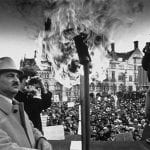COLT 211 - Comparative World Literature

Instructor: Ahmad Nadalizadeh
Term: Winter 2019
Free Speech in the Age of Empire
Condemned to death by a fatwa for having written a “blasphemous” novel, the British author Salman Rushdie had to spend many years living underground. While some scholars initially identified the fatwa as “intellectual terrorism,” others denied him any substantial right to scorn a religious figure. This course pivots on the limits of free speech vis-à-vis secular and religious totems within the institutions of literature and the law. We will ask, Who has the authority to determine those limits? Should all speech, including hate speech, be protected? Is speech reducible to its linguistic register, or should it be considered as a form of action in the world? Is freedom of speech an unchanging “principle,” or is it a “value” with a varying significance? What is the relation of literary utterance to the law? Can literature say anything and stimulate everything, or is it confined in its utterances by its juridical status? And, finally, who speaks in literature? A universal voice exerting its human right or a citizen bound by the rights of citizenship? To whom does the literary voice “respond,” and before whom is it “responsible”?
Satisfies General Education Requirements:
- Group-Satisfying: Arts and Letters
- Multicultural Courses: International Cultures (IC)